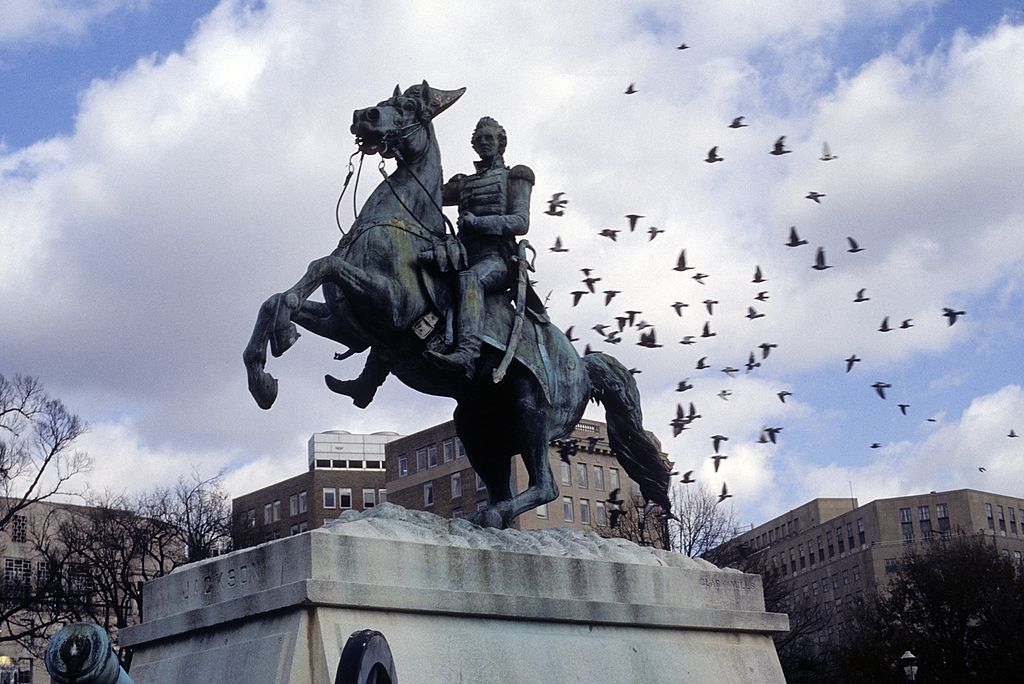
Charges of stolen presidential elections are rare in American history. Only three candidates—Andrew Jackson, Richard Nixon, and Donald Trump—have been associated with such claims. In Nixon’s case, rumors of voting irregularities in the 1960 race against John F. Kennedy prompted many of his supporters—including president Eisenhower—to demand recounts in Texas and Illinois. Nixon refused, however, insisting it would “tear the country to pieces,” and later writing, “I could think of no worse example for nations abroad, who for the first time were trying to put free electoral procedures into effect, than that of the United States wrangling over the results of our presidential election, and even suggesting that the presidency itself could be stolen by thievery at the ballot box.”
Jackson and Trump thus stand as our only presidents to challenge the legitimacy of their defeats. In a race with four candidates, Old Hickory, as Jackson was known, captured a plurality of electoral votes in the 1824 contest, but not a majority. Accordingly, a constitutionally prescribed contingent election was held in the House of Representatives (each state casting a single ballot) in which John Quincy Adams handily outdistanced the General 13 to 7 (Secretary of the Treasury William Crawford took 4 states).
Even before the House met, Jackson, sensing the possibility of defeat, had written to a colleague alleging “intrigue” and “abuses” by designing politicians. These partisans were wary of western populism, he supposed, and eager to upend his attempt (as a Tennessean) to become the first president to hail from neither Virginia nor Massachusetts. Insisting that an East Coast “combination” conspired to swing the election toward Adams, he swore the day after learning of his defeat, “The People of the west have been disregarded, and demagogues barter them as sheep in the shambles.”
Jackson’s insistence on a stolen election energized his already considerable political support. One Jacksonian argued that a series of “corrupt bargains” brought Adams to the presidency and this claim became, over the next four years, the rallying cry of the new administration’s critics.
In fact, the steal assertion lacks credibility. Nearly 60% of the electorate voted for Jackson’s opponents, while the Twelfth Amendment simply asserts that when the House selects the president “a majority of all the states shall be necessary to a choice”—and does not stipulate that the candidate with the most popular or electoral votes should receive any advantage.
But Jackson believed for the rest of his life that he had been robbed. Motivating his base, he attacked, in a well-circulating correspondence, both the Adams administration and the nimble wirepullers whom he presumed had cheated the people of their champion. In one communication he contended that “liberty never was in greater danger. . . . Let the Presidency be transmitted by the exercise of a corrupt patronage . . . and we shall soon consider the form of electing by the people a mere farce.”
Jackson went on to win the presidency in 1828 and reelection in 1832, but it was the 1824 campaign, prefaced by his momentous victory at the Battle of New Orleans during the War of 1812, that forged his path to power. He successfully portrayed himself as a political outsider (despite having served, albeit briefly, in both the House and Senate), eager to take on an arrogant coastal aristocracy. The results of the contingent House election only burnished his credentials as the candidate that the circa 1820s “deep state” had wished to destroy.
In Trump’s case it is yet unclear how much fruit this latest charge of ballot-fixing will bear. What role might it play in flipping the House and Senate in this year’s elections? How decisive will it be in determining who takes the oath of office on January 20, 2025? Observing Jackson’s inauguration in the late winter of 1829, Massachusetts senator Daniel Webster mused in some amazement over the stolen election claim and the storm it had raised. “I never saw anything thing like it before,” he wrote a relative. “Persons have come 500 miles to see Genl Jackson; & they really seem to think that the Country is rescued from some dreadful danger.”
While president, Trump rhetorically embraced Jackson as a fellow populist opposed to liberal elites. But the strongest tie between the two might be their shared sense of conspiracy—and the insight that such allegations have the power, in a divided country, to move the political needle.
More Must-Reads From TIME
- The 100 Most Influential People of 2024
- Coco Gauff Is Playing for Herself Now
- Scenes From Pro-Palestinian Encampments Across U.S. Universities
- 6 Compliments That Land Every Time
- If You're Dating Right Now , You're Brave: Column
- The AI That Could Heal a Divided Internet
- Fallout Is a Brilliant Model for the Future of Video Game Adaptations
- Want Weekly Recs on What to Watch, Read, and More? Sign Up for Worth Your Time
Contact us at letters@time.com